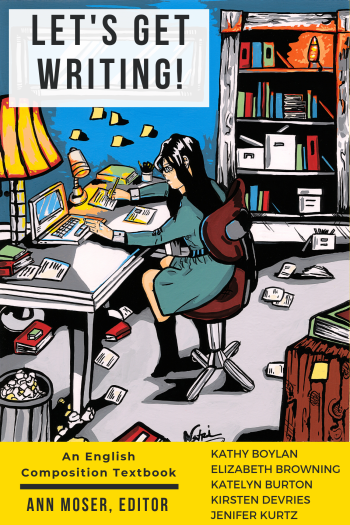Featured Sources
-
 Let's Get Writing!
by
This introduction is designed to exemplify how writers think about and produce text. The guiding features are the following: Every good piece of writing is an argument. Everything worth writing and reading begins with a specific question. Improving skills takes practice, feedback, and re-thinking, redoing, revising. The layout of our book implies there is a beginning, middle, and end to a writing course, but because writing is both an art and a skill, people will find their own processes for learning, improving, and using these skills. Writing processes differ because we are each looking for a workable schemata that fits our way of thinking. Try out a variety of writing processes and strategies, and find what works for you. If you are not uncomfortable on this journey, you simply are not stretching yet. Learning is prickly, awkward, and risky, so if it does not feel a bit unnerving, push harder and farther.
Publication Date: 2018
Let's Get Writing!
by
This introduction is designed to exemplify how writers think about and produce text. The guiding features are the following: Every good piece of writing is an argument. Everything worth writing and reading begins with a specific question. Improving skills takes practice, feedback, and re-thinking, redoing, revising. The layout of our book implies there is a beginning, middle, and end to a writing course, but because writing is both an art and a skill, people will find their own processes for learning, improving, and using these skills. Writing processes differ because we are each looking for a workable schemata that fits our way of thinking. Try out a variety of writing processes and strategies, and find what works for you. If you are not uncomfortable on this journey, you simply are not stretching yet. Learning is prickly, awkward, and risky, so if it does not feel a bit unnerving, push harder and farther.
Publication Date: 2018 -
Storycraft by From the work of the New Journalists in the 1960s, to the New Yorker essays of John McPhee, Susan Orlean, Atul Gawande, and a host of others, to blockbuster book-length narratives such as Mary Roach’s Stiff or Erik Larson’s Devil in the White City, narrative nonfiction has come into its own. Yet writers looking for guidance on reporting and writing true stories have had few places to turn for advice. Now in Storycraft, Jack Hart, a former managing editor of the Oregonian who guided several Pulitzer Prize–winning narratives to publication, delivers what will certainly become the definitive guide to the methods and mechanics of crafting narrative nonfiction. Hart covers what writers in this genre need to know, from understanding story theory and structure, to mastering point of view and such basic elements as scene, action, and character, to drafting, revising, and editing work for publication. Revealing the stories behind the stories, Hart brings readers into the process of developing nonfiction narratives by sharing tips, anecdotes, and recommendations he forged during his decades-long career in journalism. From there, he expands the discussion to other well-known writers to show the broad range of texts, styles, genres, and media to which his advice applies. With examples that draw from magazine essays, book-length nonfiction narratives, documentaries, and radio programs, Storycraft will be an indispensable resource for years to come.
Call Number: PN 3377.5 .R45 H37 2011 -
Because Digital Writing Matters by
Call Number: PE 1404 .B43 2010 -
501 Grammar and Writing Questions by
Call Number: PE 1112 .A15 2010
24/7 Live Research Help
Writing Help
Help is available in a variety of places on campus. This LibGuide will point you to sources in the library, online and other campus locations.
-
Online TutoringWith PCC's Remote Tutoring services, students can receive tutoring and writing support without coming to campus.
-
Social and Behavioral Sciences Success CenterRoom: D300
For Social Sciences Courses: American Institutions, Anthropology, Child Development, Economic, History, Humanities, Philosophy, Political Sciences, Psychology, Sociology and Statistics. -
PCC Writing Support CenterThe Writing Support Center can help you practice and perfect your writing skills. Our services are open to all PCC Students and are available for all classes.
-
Student Success Centers on CampusPCC's Success Centers are welcoming spaces that offer tutoring, coaching, counseling, academic and career workshops, study space, and access to technology.
